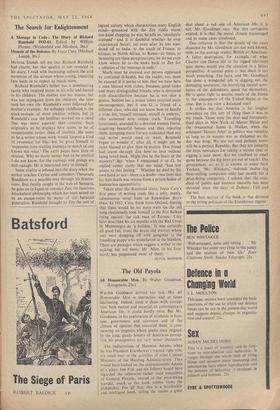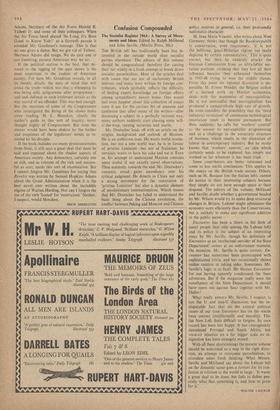The Old Payola
All Honourable Men. By Walter Goodman. (Longmans, 25s.) WALTER GOODMAN arrived too late. His All Honourable Men is instructive and at times fascinating. Indeed, since it deals with corrup- tion, both mental and material, in contemporary American life, it could hardly miss. But Mr. Goodman, in his exploration of misdeeds in busi- ness, government and television and of the climate of opinion that tolerated them, is com- menting on pygmies where giants once reigned. In the long, gaudy history of American corrup- tion his protagonists are very minor characters.
The indiscretions of Sherman Adams, when he was President Eisenhower's trusted right arm, are small beer to the activities of some Cabinet Ministers of the Harding Administration. They would have looked on the impressionable Adams as a piker. Jim Fisk and his fellows would have regarded the otherwise rather staid executives of General Floctric, snared in the price-fixing scandal. much as the bank robber views the pickpocket. For all that, this is a worthwhile and intelligent book, telling the reader a great
deal about a sad side of American life. It is not, Mr. Goodman says, that this corruption existed, It is that the moral climate encouraged and in some cases condoned.
One criticism is that the details of the cases dissected by Mr. Goodman are not well known, now, to the average reader, British or American. A fuller description, for example, of what Charles van Doren did in the rigged television quiz shows would put the situation in a better perspective. A second point is that there is too much preaching. The facts, and Mr. Goodman has done a wonderful job in digging out the damaging quotation, the horrifying mental acro- batics of the defendants, speak for themselves. He is quite right to ascribe much of the blame to the atmosphere of the United States at the time. But is his view a balanced one?
It strikes me that America is far tougher nowadays on this sort of thing than it was in my youth. Those were the dear and fortunately dead days in New York of Mayor Hylan and the ornamental James J. Walker, when the sobriquet 'Honest John' in polities was valuable as long as its wearer was as dishonest as the day was long. We are not and perhaps never will be a perfect Republic. But they are jumping the boys nowadays for taking a vicuna coat or rigging a quiz show. Are we confined to small game because the big boys are out of reach? The government, or, as it is known to some New Yorkers, `Mr. Whiskers,' indicted twelve big flour-milling companies only last month for a price-fixing conspiracy. I submit that the stan- dard of public and business morality has been elevated since the days of Doheny, Fall and the rest.
The best section of the book is that devoted to the erring politicos of the Eisenhower regime: Adams, Secretary of the Air Force Harold E. Talbott Jr. and some of their colleagues. When the Air Force 'band played `So Long, It's Been Good to Know Yuh!' at a farewell parade it sounded Mr. Goodman's message. This is that no one gives a damn. But we got rid of Talbott. Sherman Adams did resign. We do care and in our fumbling, earnest American way we act.
If the political section is the best, that de- voted to the rigging of the quiz shows is the most important to the student of American society. For here Mr. Goodman reveals, in all -its shoddy details, the state of mind that will avoid the truth—which was that a whopping lie was being told, prbgramme after programme— and seek defence in such irrelevant details as the war record of an offender. This was bad enough. But the reactions of some of the Congressmen who investigated the fixing of the shows make sorry reading. H. L. Mencken, clearly the author's guide in this sort of inquiry, never thought highly of Congressmen. But even the master would have been shaken by the bathos and emptiness of the legislators' minds as re- vealed by his disciple.
If the book includes too many pronouncements from Sinai, it still says a great deal that must be said and repeated about the shadier aspects of American society. Any democracy, certainly one as rich, and as tolerant of the rich and success- ful as ours, needs this sort of examination. But I cannot forgive Mr. Goodman for saying that Revelry was written by Samuel Hopkins Adams about the Grant Administration when it is the best novel ever written about the incredible regime of Warren Harding. Nor can I forgive the use of the verb 'hosted' for 'entertained.' Neither, I suspect, would Mencken.
DREW MIDDLETON



































 Previous page
Previous page